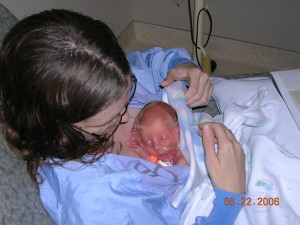By Stephanie Petters, leader of API of North Fulton, Georgia
**Originally published in the Spring 2007 annual New Baby issue of The Journal of API
 When a parent utters the word tantrum to another parent, the reaction is either a supportive smile or a grimace of dread; I have yet to see or hear another parent respond with glee. And really, who blames her? Until recently, tantrums were considered manipulation by the child to control the parent.
When a parent utters the word tantrum to another parent, the reaction is either a supportive smile or a grimace of dread; I have yet to see or hear another parent respond with glee. And really, who blames her? Until recently, tantrums were considered manipulation by the child to control the parent.
Times are changing, and the subject of childhood tantrums has new meaning and insight for parents. We now understand the reasons and/or causes of tantrums, how to effectively manage them while remaining connected to our children, and how to take preventive action for the tantrums that you can control.
What is a Tantrum?
According to the Merriam-Webster dictionary, a tantrum is a fit of a bad temper. Connection Parenting, by Pam Leo, defines a temper tantrum as a spillover of emotions, while the tantrum is the release of the accumulated hurts not seen by the parents. In Elizabeth Pantley’s Gentle Baby Care, a baby tantrum is defined as an abrupt and sudden loss of emotional control. Continue reading Decoding Tantrums



 I remember my father saying to me in 1968, “You know this business about the instinct for a small child to stay close to its mother, and the intimate bond they form? Well, I believe that it’s the same instinct to form close bonds that stays with us all our lives, and we, as adults, suffer the same feelings of loss when a loved one dies, as a child feels who’s lost its mother.”
I remember my father saying to me in 1968, “You know this business about the instinct for a small child to stay close to its mother, and the intimate bond they form? Well, I believe that it’s the same instinct to form close bonds that stays with us all our lives, and we, as adults, suffer the same feelings of loss when a loved one dies, as a child feels who’s lost its mother.”


 The term “secondary attachment” can be interpreted erroneously to mean “less important,” but Attachment Parenting International refutes this definition.
The term “secondary attachment” can be interpreted erroneously to mean “less important,” but Attachment Parenting International refutes this definition. All babies cry. And all parents are continually striving to find the best way to respond to those cries.
All babies cry. And all parents are continually striving to find the best way to respond to those cries.